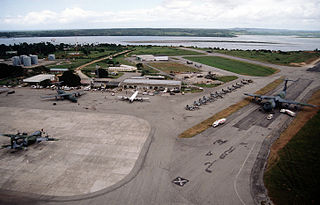
The International Criminal Tribunal for Rwanda was an international court established in November 1994 by the United Nations Security Council in Resolution 955 in order to judge people responsible for the Rwandan genocide and other serious violations of international law in Rwanda, or by Rwandan citizens in nearby states, between 1 January and 31 December 1994. The court eventually convicted 61 individuals at a cost of $1.3 billion.

United Nations Security Council Resolution 1906, adopted unanimously on December 23, 2009, after reaffirming previous resolutions on the topic and noting the situation in the Democratic Republic of the Congo, the Council decided to extend the mandate of the United Nations Mission in the Democratic Republic of Congo (MONUC) until 31 May 2010. The resolution therefore allowed 21,000 police and domestic and international troops to remain the country.

United Nations Security Council resolution 955, adopted on 8 November 1994, after recalling all resolutions on Rwanda, the Council noted that serious violations of international humanitarian law had taken place in the country and, acting under Chapter VII of the United Nations Charter, established the International Criminal Tribunal for Rwanda (ICTR).

United Nations Security Council resolution 997, adopted unanimously on 9 June 1995, after reaffirming all resolutions on the situation in Rwanda, particularly resolutions 872 (1993), 912 (1994), 918 (1994), 925 (1994), 955 (1994) and 965 (1994), the Council extended the mandate of the United Nations Assistance Mission for Rwanda (UNAMIR) until 8 December 1995 and adjusted its operations from peacekeeping to confidence-building.

United Nations Security Council Resolution 1931, adopted unanimously on June 29, 2010, after recalling resolutions 827 (1993), 1581 (2005), 1597 (2005), 1613 (2005), 1629 (2005), 1660 (2006), 1668 (2006), 1800 (2008), 1837 (2008), 1849 (2008), 1877 (2009), 1900 (2009) and 1915 (2010), the Council noted that the 2010 target for the completion of trials at the International Criminal Tribunal for the former Yugoslavia (ICTY) could not be met, and therefore extended the terms of 23 judges at the ICTY.

United Nations Security Council Resolution 1932, adopted unanimously on June 29, 2010, after recalling resolutions 955 (1995), 1165 (1998), 1329 (2000), 1411 (2002), 1431 (2002), 1717 (2006), 1824 (2008), 1855 (2008), 1878 (2008) and 1901 (2009) on Rwanda, the Council noted that the 2010 target for the completion of trials at the International Criminal Tribunal for Rwanda (ICTR) could not be met, and therefore extended the terms of 16 judges at the ICTR.
United Nations Security Council resolution 1431, adopted unanimously on 14 August 2002, after recalling resolutions 827 (1993), 955 (1994), 1165 (1998), 1166 (1998), 1329 (2000) and 1411 (2002), the council established a pool of temporary judges at the International Criminal Tribunal for Rwanda (ICTR) in order for it to complete its work as soon as possible.

United Nations Security Council Resolution 1955, adopted unanimously on December 14, 2010, after recalling resolutions 955 (1995), 1165 (1998), 1329 (2000), 1411 (2002), 1431 (2002), 1717 (2006), 1824 (2008), 1855 (2008), 1878 (2008), 1901 (2009) and 1931 (2010) on Rwanda, the Council permitted three judges to complete their cases at the International Criminal Tribunal for Rwanda (ICTR) beyond their terms of office, and increased the number of temporary judges at the tribunal.

United Nations Security Council Resolution 1966, adopted on December 22, 2010, after recalling resolutions 827 (1993) and 955 (1994), the Council established a residual mechanism to conclude the remaining tasks of the International Criminal Tribunals for Rwanda (ICTR) and former Yugoslavia (ICTY). It was the final Security Council resolution adopted in 2010.

The International Residual Mechanism for Criminal Tribunals, also referred to as the IRMCT or the Mechanism, is an international court established by the United Nations Security Council in 2010 to perform the remaining functions of the International Criminal Tribunal for the former Yugoslavia (ICTY) and the International Criminal Tribunal for Rwanda (ICTR) following the completion of those tribunals' respective mandates.

United Nations Security Council Resolution 1684, adopted unanimously on June 13, 2006, after recalling resolutions 955 (1994), 1165 (1998), 1329 (2000), 1411 (2002), 1431 (2002), 1449 (2002), 1503 (2003) and 1534 (2004) concerning the International Criminal Tribunal for Rwanda (ICTR), the Council extended the terms of 11 judges beyond their expiry dates in order for them to complete the trials in which they were sitting.

United Nations Security Council Resolution 1991, adopted unanimously on June 28, 2011, after reaffirming previous resolutions on the situation in the Democratic Republic of the Congo, the Council extended the mandate of the United Nations Organization Stabilization Mission in the Democratic Republic of the Congo (MONUSCO) until June 30, 2012.

United Nations Security Council Resolution 1993, adopted unanimously on June 29, 2011, after recalling resolutions 827 (1993), 1503 (2003) and 1534 (2003), the Council extended the terms of office of 17 permanent and temporary judges at the International Criminal Tribunal for the former Yugoslavia (ICTY).
United Nations Security Council Resolution 1995, adopted unanimously on July 6, 2011, after recalling resolutions 955 (1995), 1503 (2003) and 1534 (2003) on the International Criminal Tribunal for Rwanda (ICTR), the Council permitted temporary judges at the tribunal to vote or stand as candidates in elections to the presidency of the ICTR.
United Nations Security Council Resolution 2013 was unanimously adopted on 14 October 2011.
United Nations Security Council Resolution 1794 was unanimously adopted on 21 December 2007.
United Nations Security Council Resolution 1877 was unanimously adopted on 7 July 2009.
United Nations Security Council Resolution 1878 was unanimously adopted on 7 July 2009.
United Nations Security Council Resolution 1824 was unanimously adopted on 18 July 2008.
United Nations Security Council Resolution 1855 was unanimously adopted on 19 December 2008.











